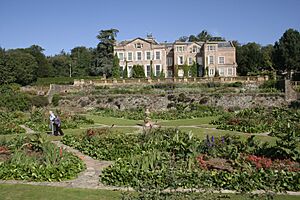Sir Francis Warre, 1st Baronet facts for kids
Sir Francis Warre, 1st Baronet (born around 1659, died 1718) was an important landowner and politician in England. He lived at Hestercombe House in Somerset. He was a member of the Tory party, which was one of the main political groups at the time. Sir Francis served in the English and British Parliament for many years, from 1685 to 1715.
Contents
Sir Francis Warre: A Life in Politics
Early Life and Family History

Sir Francis Warre was the only son of Sir John Warre. His family had lived at Hestercombe since the year 1375. His mother was Unton Hawley. When his father passed away in 1669, young Francis inherited the family estates. This made him one of the biggest landowners in Somerset.
In 1673, he was given a special title: Baronet. This meant he was called "Sir Francis Warre, 1st Baronet." He went to Sherborne School and then studied at Oriel College, Oxford when he was 15 years old. For a short time, he was a Captain in the Duke of Monmouth's army. He later married Anne Cuffe, who sadly passed away in 1690. He then married Margaret Harbin.
His Political Journey
Sir Francis Warre became a Deputy Lieutenant of Somerset in 1680. This role involved helping to keep order and support the local military. He also became a Justice of the Peace (JP) in 1681, which meant he helped enforce laws. He was known for being strict with people who didn't follow the official church rules.
In 1685, he was elected as a Member of Parliament (MP) for Bridgwater. An MP is a person elected to represent their area in Parliament, where laws are made. He was a member of the Tory party, which generally supported the King and the Church of England.
Sir Francis was against the Monmouth Rebellion, a revolt against King James II. However, King James II's agents didn't trust him because he strongly supported the Church of England and disagreed with the King's religious policies. Because of this, he was removed from his Deputy Lieutenant role in 1687.
After the "Glorious Revolution" in 1688, when King James II was replaced, Sir Francis was given his roles back as a Justice of the Peace and Deputy Lieutenant. He was re-elected as an MP for Bridgwater in 1689. He continued to serve as a Tory MP under King William III and Queen Anne.
He was re-elected for Bridgwater in 1690. He also served as a colonel in the Somerset militia, a local military force. Later, he became an MP for Taunton in 1701, a town close to his estate. He was also appointed Recorder of Taunton, a legal position.
Sir Francis continued to be re-elected as an MP for Taunton in several elections, including 1702, 1705, 1708, 1710, and 1713. He was known for opposing the ongoing war at the time and for trying to fix problems from previous governments.
In 1715, he was re-elected for Taunton, but he lost his seat after someone challenged the election result. Later that year, he was briefly arrested because he was suspected of supporting the Jacobites. The Jacobites were people who wanted to bring back the old royal family to the throne. He was released a few months later.
Later Years and Legacy
Sir Francis Warre passed away in Ghent on December 1, 1718. He was buried with his family in Kingston. He had a son named Michael from his first marriage, but Michael died before him. He also had a son from his second marriage who died as a baby.
Sir Francis had one surviving daughter, Margaret. Because he had no living sons, his special title of Baronet ended when he died. His estate, including Hestercombe, went to his daughter Margaret. She married John Bampfylde. Eventually, the estate passed to their grandson, John Tyndale, who later took the name Warre to continue the family name.
 | Anna J. Cooper |
 | Mary McLeod Bethune |
 | Lillie Mae Bradford |

